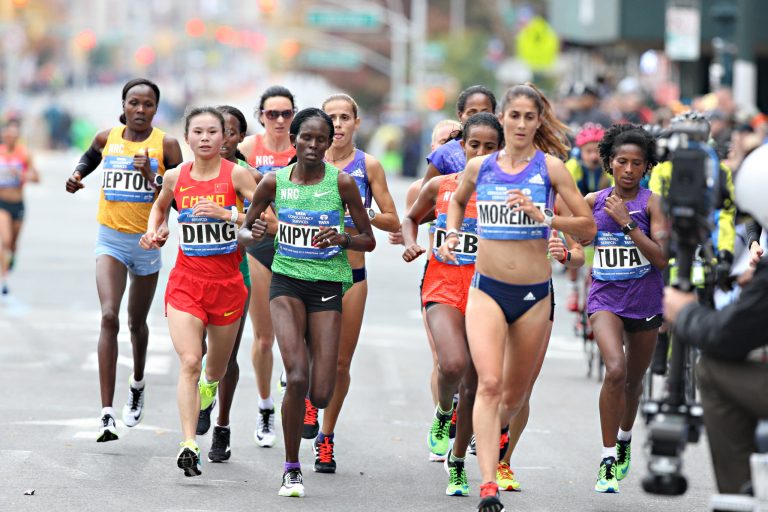Are Marathon Runners Allowed to Listen to Music
Marathon runners are allowed to listen to music during races, as long as it doesn’t obstruct their awareness or compromise their safety. Marathon running is all about pushing limits, persevering through challenges, and achieving personal goals.
For many runners, music serves as a source of motivation and distraction, aiding in their performance during long-distance races. However, there has been some debate regarding whether or not listening to music should be allowed during marathons. We will explore the rules and regulations surrounding music in marathons, the potential benefits and drawbacks of running with music, and the different perspectives on this subject.
So, if you’re a marathon runner who’s wondering about the permissibility of listening to music during a race, keep reading to find out more.
The Debate Over Music During Marathons
When it comes to marathon running, a hotly debated topic is whether runners should be allowed to listen to music during the race. Proponents argue that music can provide motivation and help runners maintain a steady pace, while opponents express concerns about safety and the impact on performance. Let’s delve into the conflicting views regarding the use of music during marathons.
Safety Concerns
Many marathon organizers have instituted restrictions or outright bans on the use of headphones and earbuds due to safety concerns. The inability to hear ambient sounds such as approaching runners, traffic, and race instructions poses a significant risk to both the wearer and those around them. In fact, some races have adopted policies disqualifying runners caught wearing headphones. This rule is designed to ensure the safety of all participants and mitigate the potential for accidents.
Impact On Performance
Another point of contention is the potential impact of music on a runner’s performance. Advocates argue that music can provide a psychological boost, aiding in distraction from fatigue and contributing to maintaining a consistent pace. However, critics argue that isolating oneself with music may hinder a runner’s ability to gauge their effort and adjust to race conditions. Additionally, some have raised concerns that prolonged exposure to loud music may lead to hearing damage. The debate over the use of music during marathons remains a topic of ongoing discussion, with valid points being made on both sides.

Credit: www.thesportreview.com
Rules And Regulations
Marathon runners are subject to rules and regulations when it comes to listening to music during races. Some events allow headphones, while others prohibit them for safety reasons. Checking the specific guidelines of each race is essential for runners wanting to enjoy music while running.
Official Marathon Guidelines
Marathons are major sporting events that require participants to adhere to a set of rules and regulations. These guidelines are put in place to ensure the safety and fairness of the race. When it comes to listening to music while running a marathon, many event organizers have specific rules regarding the use of headphones and earphones.
Most official marathon guidelines prohibit the use of headphones or any audio devices that may impede a runner’s ability to hear instructions from race officials, fellow competitors, or emergency vehicles. The main concern is that listening to music can pose a safety risk by blocking out important sounds on the racecourse.
Furthermore, marathon rules typically state that runners should always be aware of the environment around them, and the use of headphones may hinder that awareness. The sound of approaching runners, hydration stations, and spectators’ cheers can all be valuable cues that are missed when wearing headphones. This can also impact the overall race experience by isolating runners from the energy and camaraderie shared among participants and spectators.
Exceptions And Special Circumstances
While most marathons have strict regulations regarding the use of audio devices, there are certain exceptions and special circumstances. For instance, some marathons have designated “music zones” along the racecourse where participants are allowed to listen to music. These zones are typically well-marked, and runners can choose to enter or bypass them depending on their preference.
Additionally, individuals with hearing impairments may be granted permission to use hearing aids or other assistive devices during the race. Special provisions may also be made for visually impaired runners who rely on audio cues for navigation and communication.
It is important to note that each marathon may have its own specific guidelines and exceptions, so it is crucial for participants to thoroughly review the rules and regulations provided by the event organizers before race day.
Benefits Of Listening To Music
Marathon runners can benefit from listening to music as it can help improve their performance and motivation. Music can act as a distraction from physical discomfort and fatigue, helping runners to maintain their pace and push through challenging moments during the race.
Listening to music during a marathon can also enhance runners’ focus and mindset, contributing to a more positive race experience.
Mental Boost
Every runner knows that running a marathon is not just a physical challenge; it’s a mental one too. Listening to music during a marathon can provide a much-needed mental boost. The rhythmic beats and uplifting melodies can help distract the mind from fatigue and negative thoughts, keeping runners focused and motivated. Research has shown that listening to music can increase dopamine levels in the brain, which enhances mood and reduces perceived exertion. So, by having their favorite tunes playing, marathon runners can tap into a powerful source of motivation and positivity.
Distraction From Fatigue
One of the biggest challenges that marathon runners face is combating fatigue. As the miles add up, the body starts to feel the strain, and exhaustion sets in. However, listening to music can provide a much-needed distraction from the physical fatigue, helping runners power through those tough moments. The catchy melodies and engaging lyrics can divert the mind’s attention away from the pain and discomfort, allowing runners to push through the most challenging parts of the race. Music acts as a form of entertainment and escapism, providing a mental break from the physical demands of marathon running.
Code:
“`
Reasons why marathon runners should be allowed to listen to music:
- Mental Boost
- Distraction from Fatigue
“`
In conclusion, allowing marathon runners to listen to music during races can offer several benefits. It provides a mental boost, keeping runners motivated and focused, and serves as a distraction from fatigue, helping them push through the toughest moments. So, the next time you see a marathon runner with their headphones on, know that they are harnessing the power of music to enhance their performance and make their journey to the finish line a little bit easier.

Credit: www.runandbecome.com
Arguments Against Music
When it comes to the debate on whether marathon runners should be allowed to listen to music during races, there are several arguments against the practice. While many runners believe that music can enhance their performance and keep them motivated throughout the race, there are valid concerns regarding decreased awareness and interference with the overall race experience.
Decreased Awareness
Listening to music can lead to decreased awareness of one’s surroundings during a marathon. Without the ability to hear important instructions from race officials or calls for assistance, runners may be at risk of missing vital information that could affect their safety and well-being. Moreover, the inability to hear other runners approaching or potential hazards on the race course could lead to accidents and injuries.
Interference With Race Experience
Music may interfere with the race experience for both the runner and those around them. The use of headphones and loud music can isolate the runner from the supportive and encouraging atmosphere of the race, detracting from the sense of camaraderie and competition. Additionally, some argue that the distraction of music can take away from the mental toughness and focus required to complete a marathon, potentially impacting the athlete’s overall performance.
Alternative Options For Motivation
Marathon runners are not allowed to listen to music during races, but there are several alternative ways to stay motivated throughout the run.
Mantras And Positive Affirmations
Repeating positive affirmations can help runners stay focused and motivated during the race.
Running With A Group
Joining a running group can provide encouragement and support, making the marathon experience more enjoyable.

Credit: stock.adobe.com
Frequently Asked Questions
Can You Listen To Music During Marathons?
Yes, you can listen to music during marathons if you wish. Many runners find it motivating and enjoyable. However, it is important to consider safety and follow race regulations regarding headphone usage.
Are Professional Runners Allowed To Listen To Music?
Yes, professional runners are allowed to listen to music while running.
Why Do Elite Runners Not Listen To Music?
Elite runners avoid music to stay focused, tune into their bodies, and maintain pace. It helps them concentrate and connect with their surroundings, enhancing performance.
Conclusion
Marathon runners should enjoy music in a way that doesn’t compromise their safety and mindfulness. By adhering to event-specific rules and using earphones that allow ambient sound, runners can enhance their experience. So, while the debate continues, it’s clear that music can play a positive role in a runner’s journey.






